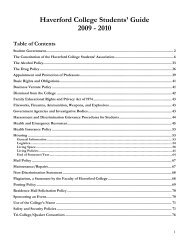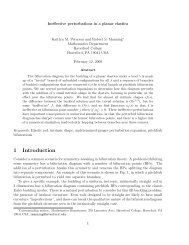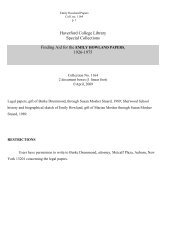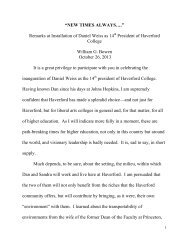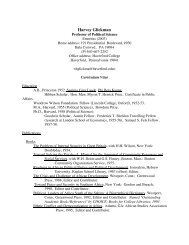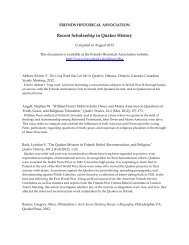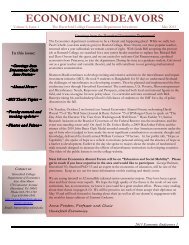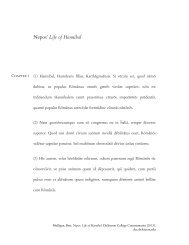Spring 2002 - Haverford College
Spring 2002 - Haverford College
Spring 2002 - Haverford College
You also want an ePaper? Increase the reach of your titles
YUMPU automatically turns print PDFs into web optimized ePapers that Google loves.
John Whitehead<br />
of federal money—Whitehead is charged<br />
with the unenviable task of putting his<br />
city back together again. Despite his love<br />
for New York, it wasn’t a chore he was<br />
eager to undertake.<br />
“I was both surprised and distressed<br />
when Governor Pataki asked me to head<br />
this,” he says. “I said to him, ‘Governor,<br />
when you created this company, you said<br />
that this would be a 10-year project. I’m<br />
80 years old, so I’ll be 90 when the project<br />
is completed. Did you know that?’” Pataki<br />
admitted that no, he hadn’t realized this,<br />
but, says Whitehead, the governor<br />
responded, “I still want you to do it.” He<br />
gave Whitehead 48 hours to make a decision,<br />
during which time a variety of friends<br />
and colleagues called him and begged him<br />
to accept the position, reiterating their belief<br />
that he was the only person for the job.<br />
In the end, says Whitehead, “I couldn’t<br />
say no. I called the governor about five<br />
minutes before the 48 hours were up and<br />
accepted.”<br />
Looking back on the reasons Pataki and<br />
others wanted him for the job, Whitehead<br />
chuckles, “I think they thought that at my<br />
age I wouldn’t be very ambitious.”<br />
Seriously, he says, “I had spent 38 years<br />
working in Wall Street, so [Pataki] knew<br />
that the city was a big part of my life and<br />
that I understood it. He also knew that I<br />
had many friends, fellow New Yorkers,<br />
who would be involved in all of this.”<br />
Since taking the position, Whitehead<br />
has found that a typical day “begins when<br />
I wake up and ends when I go to sleep.”<br />
There are many people to consult, many<br />
meetings to call and attend, press conferences<br />
to host, and advisory committees<br />
whose voices must be heard. In contrast,<br />
says Whitehead, a weekend of board meetings<br />
at <strong>Haverford</strong> is the equivalent of a<br />
vacation.<br />
Whitehead and his committee are not<br />
merely charged with revitalizing Lower<br />
Manhattan, but also sending an undeniable<br />
message to the rest of the world. “It<br />
should send the message that New York<br />
City has recovered from a terrible disaster,<br />
one that we and the rest of the country<br />
and world will never forget.” It’s a<br />
responsibility that would make many<br />
blanch, but John Whitehead accepts it<br />
with grace and easy confidence.<br />
It seems as if everything Whitehead<br />
has seen, done and experienced in his lifetime<br />
has prepared him for his present task.<br />
He grew up in Montclair, where he cultivated<br />
his love of all things New York.<br />
His mother’s passion for opera took them<br />
both to the Met several times, while<br />
Whitehead’s passion for baseball drew him<br />
to the home games of the famous New<br />
York Giants. He made a special point to<br />
visit the Statue of Liberty as a birthday<br />
treat one year.<br />
His <strong>Haverford</strong> education, he says, significantly<br />
contributed to his professional<br />
and personal development. “I think in<br />
many ways <strong>Haverford</strong> set my character,<br />
who I turned out to be,” he says. “I realized<br />
here the importance of service, that<br />
we were all here to try and serve, and that<br />
accomplishing things for ourselves was<br />
not the most important thing. I learned<br />
that each individual, and his views, were<br />
important.”<br />
This philosophy served him well as he<br />
and his fellow Fords prepared for war in<br />
1943, the year of Whitehead’s graduation.<br />
“That was a war that unified the country,”<br />
he remembers. “Everybody in my class at<br />
<strong>Haverford</strong> went into the service right after<br />
we graduated. In those days being classified<br />
4-f—unqualified—was an embarrassment<br />
rather than a privilege.” Some<br />
of his classmates left school before graduation<br />
to join the service, but most—<br />
including Whitehead—benefited from<br />
<strong>Haverford</strong>’s accelerated graduation: “We<br />
took classes the summer after our junior<br />
year and graduated in January rather than<br />
June, so we could sign up.”<br />
Whitehead joined the Navy, and found<br />
himself traversing both the Atlantic and<br />
Pacific to join in the invasions of<br />
Normandy, Southern France, Iwo Jima and<br />
Okinawa. “The ship that I was on was an<br />
amphibious transport ship,” he says. “It<br />
carried small boats on deck, lowered them<br />
into the water loaded with troops, and sent<br />
them in to make invasions.” Despite his<br />
participation in these historical battles,<br />
Whitehead is reluctant to refer to himself<br />
as a “hero;” he reserves that term for the<br />
soldiers who fought on those beaches. “I<br />
drove one of these small boats and landed<br />
in the first wave on D-Day. More than<br />
half the 20 soldiers in my boat were killed<br />
before they got off the beach. They were<br />
the ones that deserve heroes’ medals.”<br />
After returning from the war,<br />
Whitehead received his MBA with distinction<br />
at Harvard Business School, and<br />
then entered into the first of what he calls<br />
the “three phases” of his life. In 1947 he<br />
joined Goldman Sachs, a leading<br />
Manhattan-based investment banking and<br />
securities firm; established in 1869, it is<br />
one of the country’s oldest and largest<br />
investment firms. He rose rapidly through<br />
the ranks, becoming partner in 1956 and<br />
senior partner and co-chairman in 1976.<br />
He retired in 1984 after 38 years with the<br />
firm, but continued to serve on the boards<br />
of numerous financial companies and as a<br />
director of the New York Stock Exchange.<br />
In 1985, the second phase of his life<br />
unexpectedly led him to Washington,<br />
D.C., to be Deputy Secretary of State in<br />
the Reagan Administration under<br />
George Shultz. He took special interest<br />
in relations with Eastern Europe, the<br />
United Nations, and reforms in the<br />
State Department, and was awarded the<br />
President’s Citizens Medal for his<br />
efforts.<br />
In 1989, Whitehead returned to New<br />
York City and began the third—and what<br />
he assumed would be the final—phase of<br />
his life, as a dedicated philanthropist and<br />
an active board member of many educational,<br />
civic, and charitable organizations.<br />
He wore the hat of chairman in several<br />
capacities: for the board of the Federal<br />
Reserve Bank of New York, the United<br />
Nations Association, the Andrew W.<br />
Mellon Foundation, the Brookings<br />
Institution, the Asia Society, International<br />
House, and AEA Investors, Inc. And he<br />
has been an active member of <strong>Haverford</strong>’s<br />
Board of Managers and Chairman of the<br />
Board from 1972 to 1982.<br />
“I was lucky to make a lot of money,”<br />
he explains, plain and direct as usual.<br />
“And my tastes were never very fancy. I<br />
was never interested in owning yachts or<br />
racehorses or anything like that; I preferred<br />
to give it away to worthy institutions.”<br />
He finds philanthropy extremely<br />
satisfying, he says, because it allows him<br />
to be involved in the organizations to<br />
which he gives, and so offers him the<br />
opportunity to make a difference in ways<br />
besides simply providing money.<br />
Reflecting on the winding road of his<br />
life, Whitehead realizes a lesson he has<br />
learned. “People can be a lot of things in<br />
their lives—they don’t necessarily have to<br />
be one thing forever—and life goes on<br />
18 <strong>Haverford</strong> Magazine




